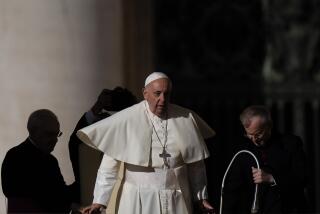We Should Trust Women to Do the Choosing
- Share via
In the first chapter of Genesis, it is written, “God created human beings in God’s image, male and female God made them, and God saw that it was good.” Clearly, God was thinking of equals. Yet while the Catholic Church professes to support choice for women, the choices are limited to a woman’s role as wife and mother. For example, nowhere does the church support a woman’s choice to heed God’s call to ordination. Nor does it support the right of a woman to choose how God would use her in the world.
Instead, the church supports choices associated with limiting the role of women and denounces a choice that may lead to an abortion. This is because the Vatican and many other religious voices promote compulsory pregnancy for women. That is, whether you are pregnant by accident, incest or rape, you must stay pregnant. This is based on the notion that a fertilized egg equals life, because God made it so.
However, science tells us that only 10% to 15% of fertilized eggs develop into human beings. A large percentage of fertilized eggs never attach to a woman’s uterine wall, and many others detach in the first several weeks or simply stop developing. Thus, the vast majority of fertilized eggs simply wash away.
It seems a stretch to conclude that ending a pregnancy is somehow against the will of God when the body rejects more than half of what the Vatican considers a “pregnancy.”
Motherhood is an important role. However, it is not the definition of womanhood. A woman who finds herself pregnant and considers an abortion is considering many things of importance to her. Usually these factors are known only to her and those closest to her. Outsiders, therefore, cannot judge her decision.
However, much religious dogma does not permit women to be seen as equal human beings. And how can you trust women when you look down on them? The first chapter of Genesis indicates that the world cannot be the world God wants it to be if we consider women less equal and, indeed, less valuable than a fetus.
We need the influence of women in many areas of life. The world is unbalanced by our limitation of women to the role of mother alone. As long as a church does not treat women as moral beings equal to men, it cannot even contemplate the issue of choice.
It was not an accident that God chose women to bear the responsibility of childbearing. With that responsibility, God placed his confidence in women as moral agents. As such, women--not men--have the first responsibility about whether to bear children.
God’s design for humanity includes “free will,” the theological and ethical nomenclature for the “right to choose.” God did not say, “I give you the right to choose, but you must always choose my way.” It was a risk that God took.
The prophetic movement of Israel and the teachings of Jesus also agree that the right to choose is sacred. Prophets prefer that people follow a certain path, but the right to choose is always upheld.
Should a woman who wakes to the reality of unplanned pregnancy be further plagued if she has determined that having a child is not the right choice for her? What if she already has the number of children she can support financially and emotionally? What if she has been preyed upon? What if she feels she is too young or too old? What if she feels she is not equipped to be a mother? What if the doctor has told her that another pregnancy will kill her? Should she consult her minister or her legislator?
We trust women, as we believe God does, to make the choice that is right for them.
It is sad to see that smart and moral people are blinded by dogma instead of guided by the biblical tenets we in the Jewish and Christian communities are called to pursue. The church calls for honesty in using the word “choice” when it comes to a pregnancy. But in doing so, it questions the integrity of those of us who, following God’s example, stand for a woman’s right to choose what she, her doctors, her religious leaders and her conscience lead her to choose.


